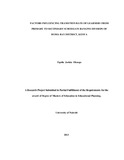| dc.description.abstract | The purpose of this study was to establish factors influencing transition rates from
public primary schools to secondary schools in Rangwe Division, Homa Bay
District. Specifically, the study was set to establish how costs of education affect
transition rates from public primary schools to secondary schools; how economic
activities of the parents influence the transition rates from public primary schools
to secondary schools; how the pupils’ family background influence the transition
rate from public primary to secondary schools as well as finding out the influence
of social cultural practices in the community on the transition rate from public
primary to secondary schools. The study was promoted by the fact that transition
in Homa Bay District is low compared to the neighbouring districts. There were
also lack of researchers who had carried out a similar study in Rangwe Division,
Homa Bay District. The study employed a descriptive survey research design
where the target population consisted of all the 100 head teachers of the public
primary schools in Rangwe Division, Homa Bay district and 2119 pupils
comprising the standard eight classes in the public primary schools in the division
and the district education officer Homa Bay District. The stratified random
sampling method was used to pick 30% of the public primary schools with 34
head teachers and 639 learners selected. Qualitative data obtained from personal
interviews and open-ended questions were analyzed qualitatively through content
analysis and organized into themes and patterns corresponding to the research
questions. Descriptive statistics such as frequency distribution, means and
percentages were run on all quantitative data. The study concludes that, transition
from primary school to secondary schools is highly determined by the cost of
education, economic activities of the parents, learners’ family background as well
as the social cultural factors. The cost of education is reflected in the amount
incurred to settle the student in school including school fees and levies as well as
personal expenses. Given that the Kenyan education system insists on a free and
compulsory primary education as we as a subsidized secondary education, this
study recommends that the government should instigate effective machineries to
ensure that no learner is blocked from transiting to secondary school because of
fees and other levies. | en |

